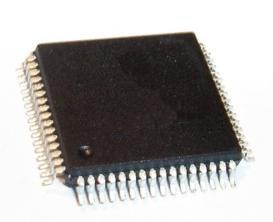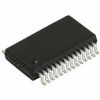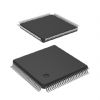Features: ` Separate independent read and write data ports
- Supports concurrent transactions
` 267 MHz clock for high bandwidth
` 2-word burst on all accesses
` Double Data Rate (DDR) interfaces on both read and write ports (data transferred at 534 MHz) at 267 MHz
` Two input clocks (K and K) for precise DDR timing
- SRAM uses rising edges only
` Two input clocks for output data (C and C) to minimize clock skew and flight time mismatches
` Echo clocks (CQ and CQ) simplify data capture in high-speed systems
` Single multiplexed address input bus latches address inputs for both read and write ports
` Separate port selects for depth expansion
` Synchronous internally self-timed writes
` QDR™-II operates with 1.5 cycle read latency when Delay Lock Loop (DLL) is enabled
` Operates like a QDR-I device with 1 cycle read latency in DLL off mode
` Available in x8, x9, x18, and x36 configurations
` Full data coherency, providing most current data
` Core VDD = 1.8V (±0.1V); IO VDDQ = 1.4V to VDD
` Available in 165-Ball FBGA package (15 x 17 x 1.4 mm)
` Offered in both Pb-free and non Pb-free packages
` Variable drive HSTL output buffers
` JTAG 1149.1 compatible test access port
` Delay Lock Loop (DLL) for accurate data placementSpecificationsExceeding maximum ratings may impair the useful life of the device. These user guidelines are not tested.
Storage Temperature ................................. 65°C to +150°C
Ambient Temperature with Power Applied..... 10°C to +85°C
Supply Voltage on VDD Relative to GND..............0.5V to +2.9V
Supply Voltage on VDDQ Relative to GND............0.5V to +VDD
DC Applied to Outputs in High-Z ............ 0.5V to VDDQ + 0.3V
DC Input Voltage [11] .............................. 0.5V to VDD + 0.3V
Current into Outputs (LOW) .......................................... 20 mA
Static Discharge Voltage (MIL-STD-883, M. 3015)....... > 2001V
Latch-up Current ...................................................... > 200 mADescriptionThe CY7C1410JV18, CY7C1425JV18, CY7C1412JV18, and CY7C1414JV18 are 1.8V Synchronous Pipelined SRAMs, equipped with QDR-II architecture. QDR-II architecture consists of two separate ports: the read port and the write port to access the memory array. The read port has data outputs to support read operations and the write port has data inputs to support write operations. QDR-II architecture has separate data inputs and data outputs to completely eliminate the need to "turn-around" the data bus required with common IO devices. Access to each port is accomplished through a common address bus. The read address is latched on the rising edge of the K clock and the write address is latched on the rising edge of the K clock. Accesses to the QDR-II read and write ports are completely independent of one another. To maximize data throughput, both read and write ports are provided with DDR interfaces. Each address location is associated with two 8-bit words (CY7C1410JV18), 9-bit words (CY7C1425JV18), 18-bit words (CY7C1412JV18), or 36-bit words (CY7C1414JV18) that burst sequentially into or out of the device. Because data can be transferred into and out of the device on every rising edge of both input clocks (K and K and C and C), memory bandwidth is maximized while simplifying system design by eliminating bus "turn-arounds".
Depth expansion of CY7C1410JV18, CY7C1425JV18, CY7C1412JV18, and CY7C1414JV18 is accomplished with port selects, which enables each port to operate independently.
All synchronous inputs of CY7C1410JV18, CY7C1425JV18, CY7C1412JV18, and CY7C1414JV18 pass through input registers controlled by the K or K input clocks. All data outputs pass through output registers controlled by the C or C (or K or K in a single clock domain) input clocks. Writes are conducted with on-chip synchronous self-timed write circuitry.

 CY7C1425JV18 Data Sheet
CY7C1425JV18 Data Sheet







